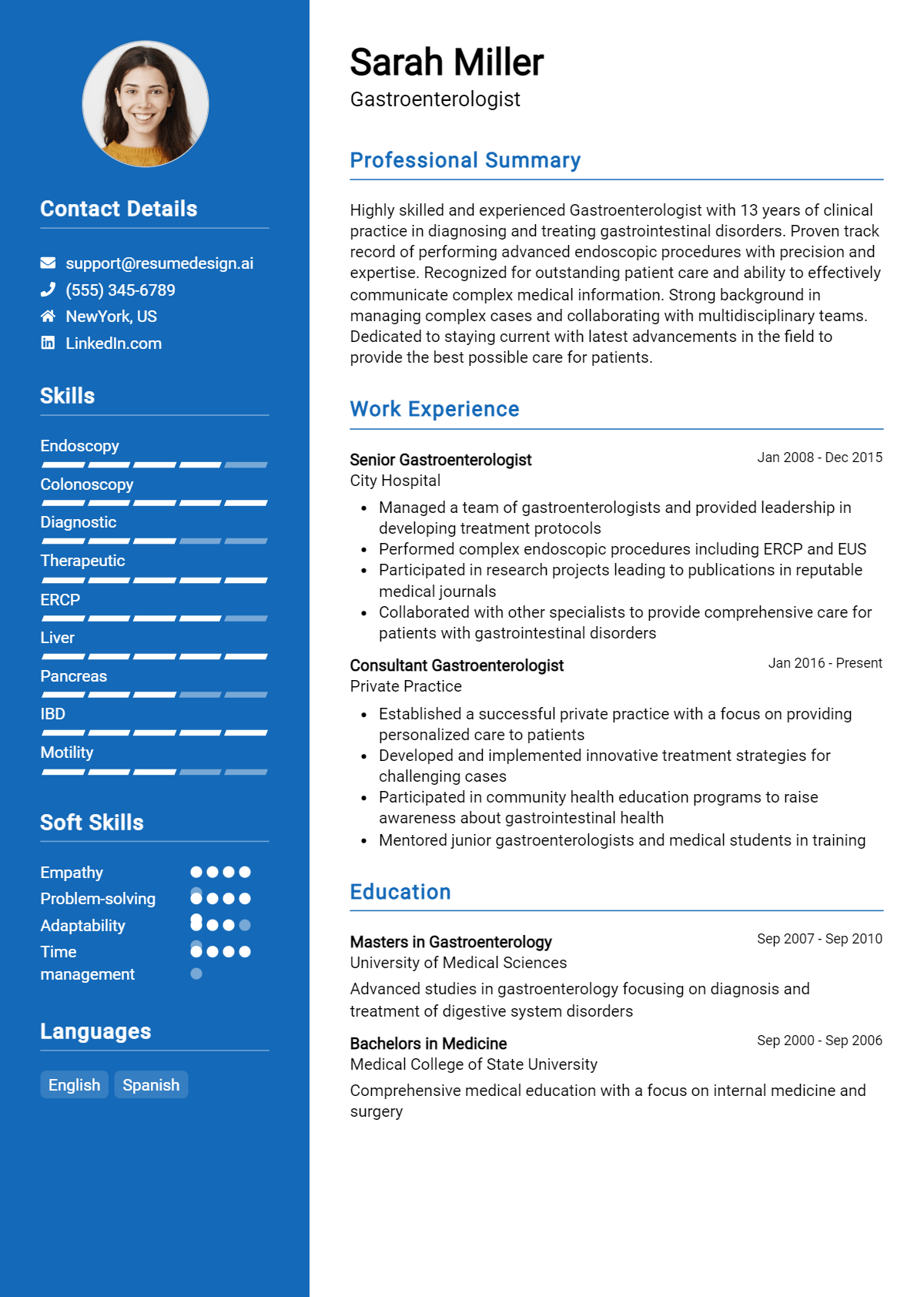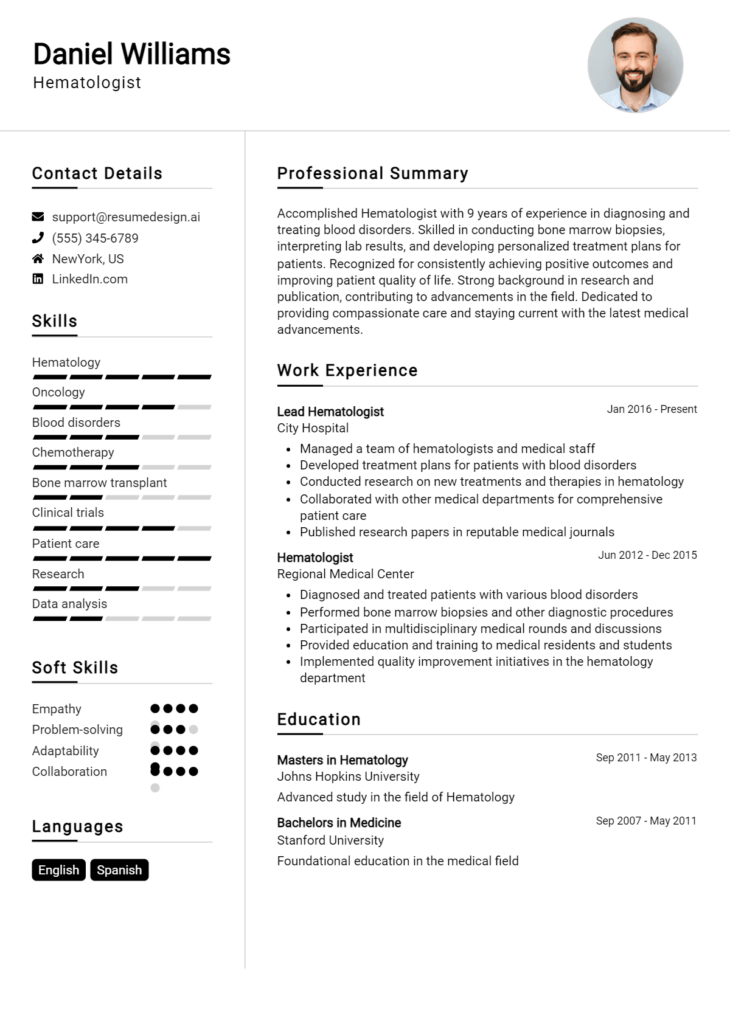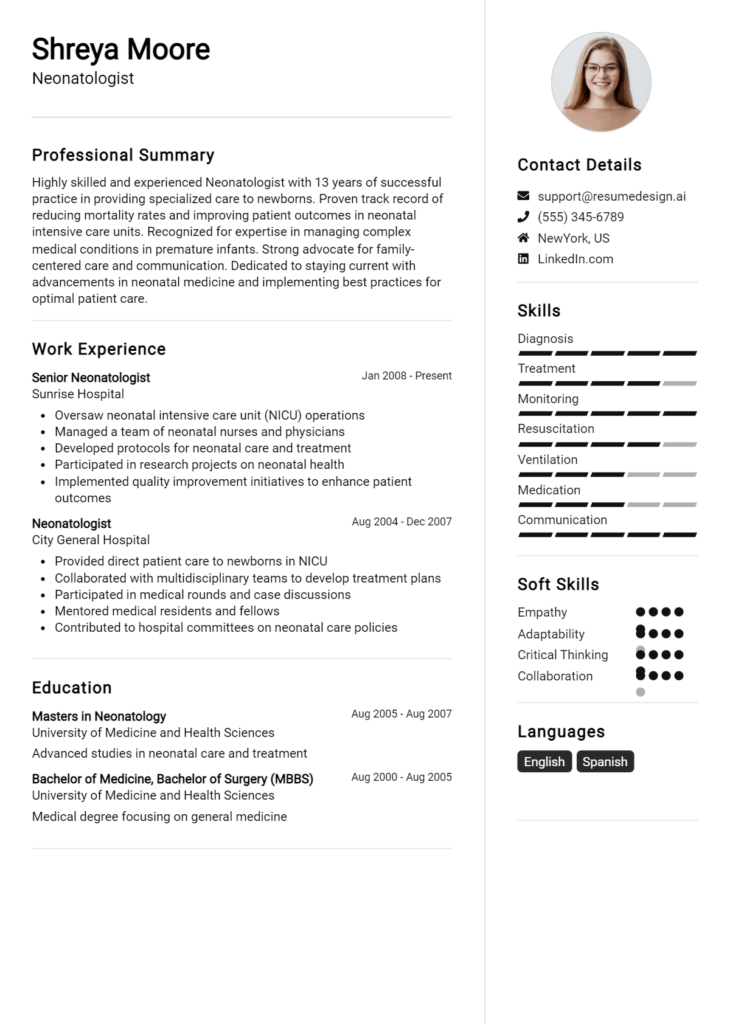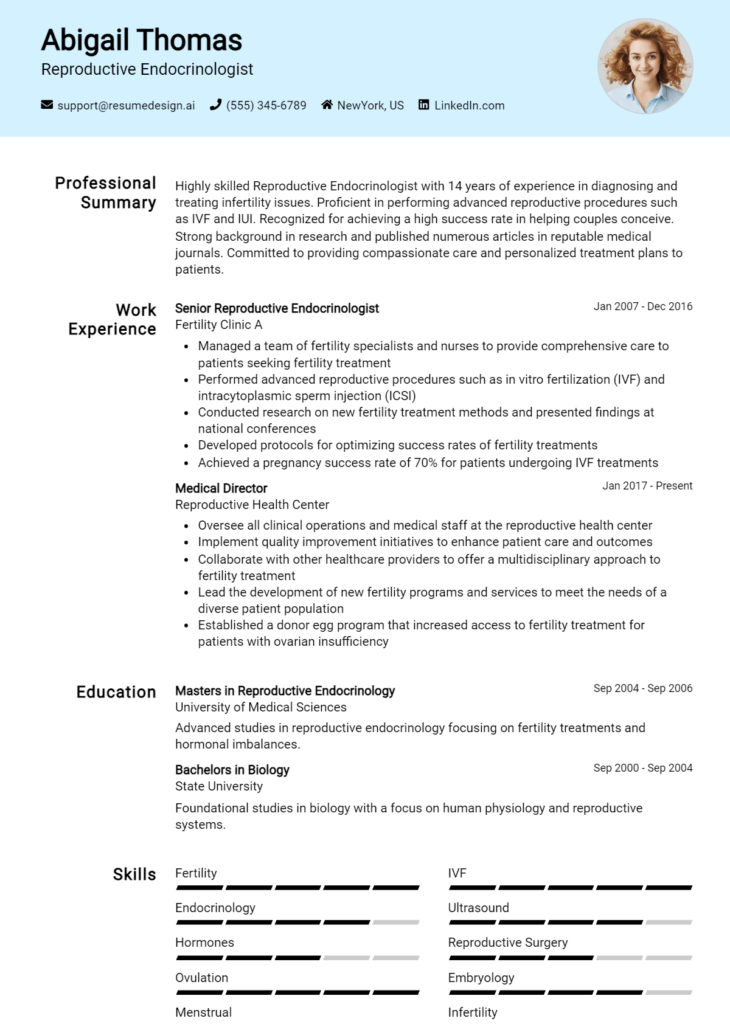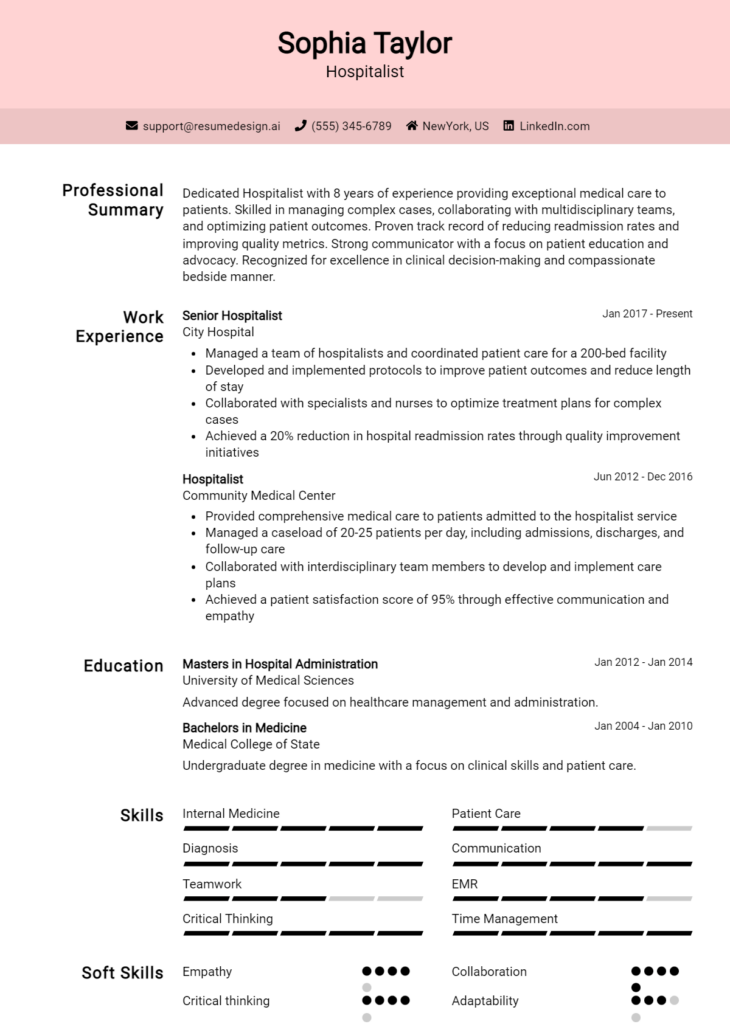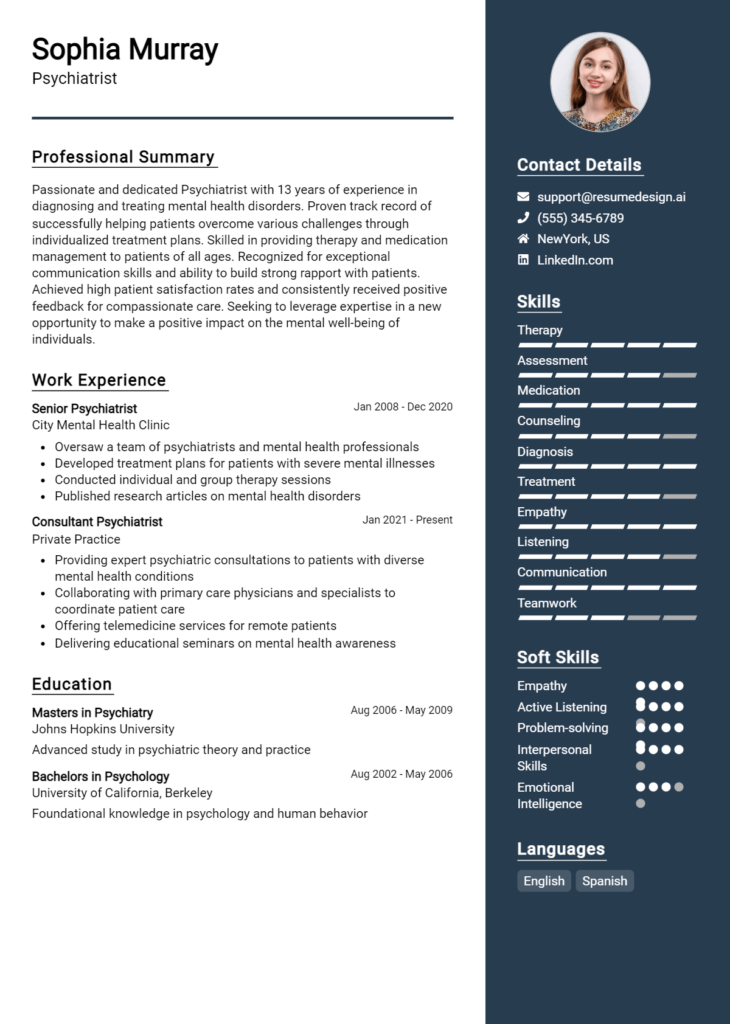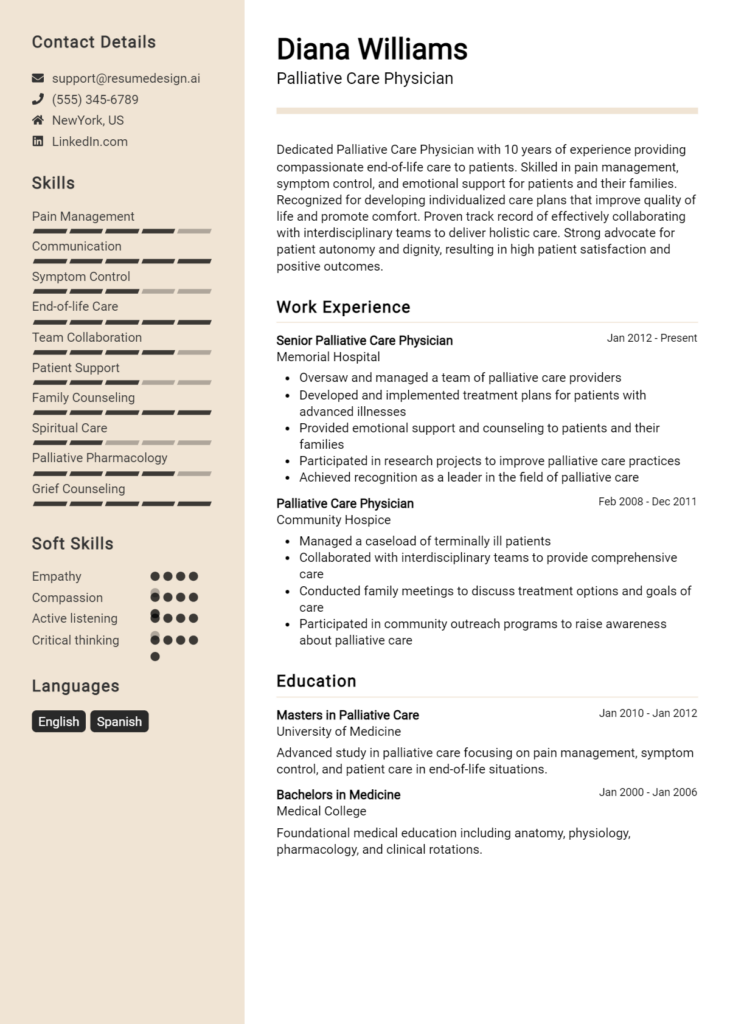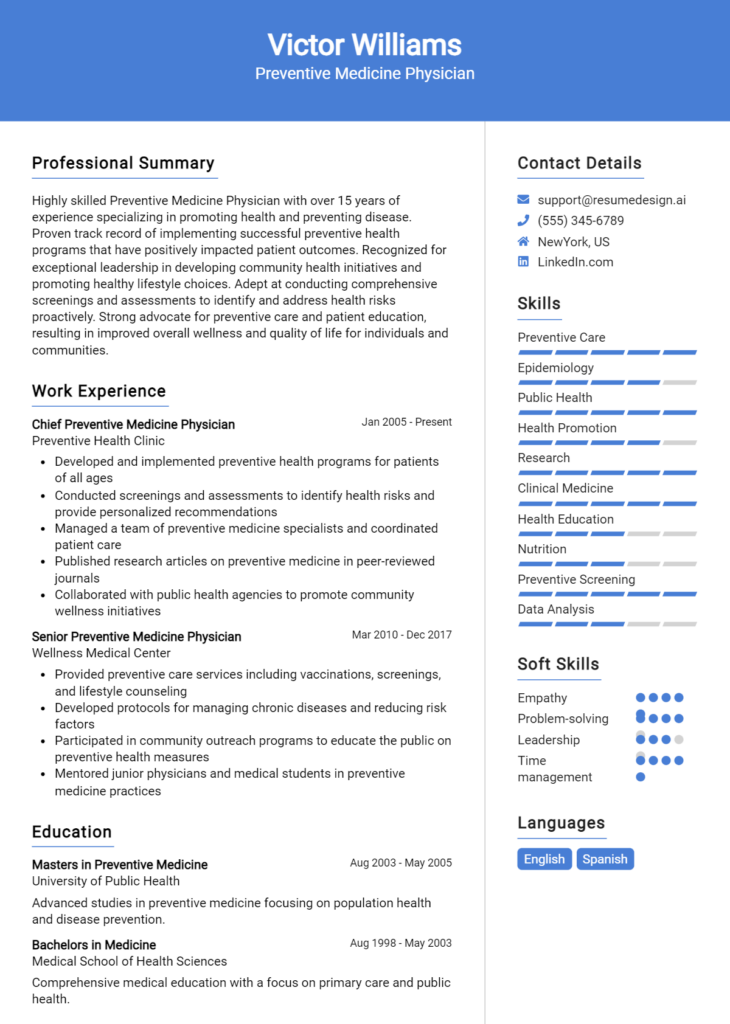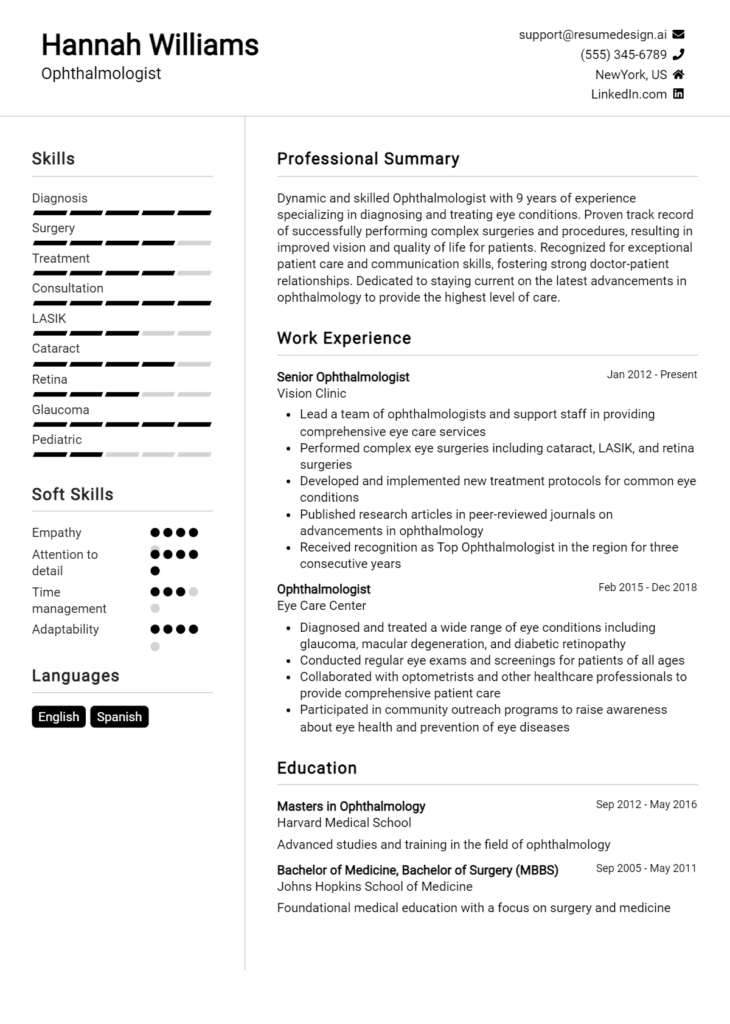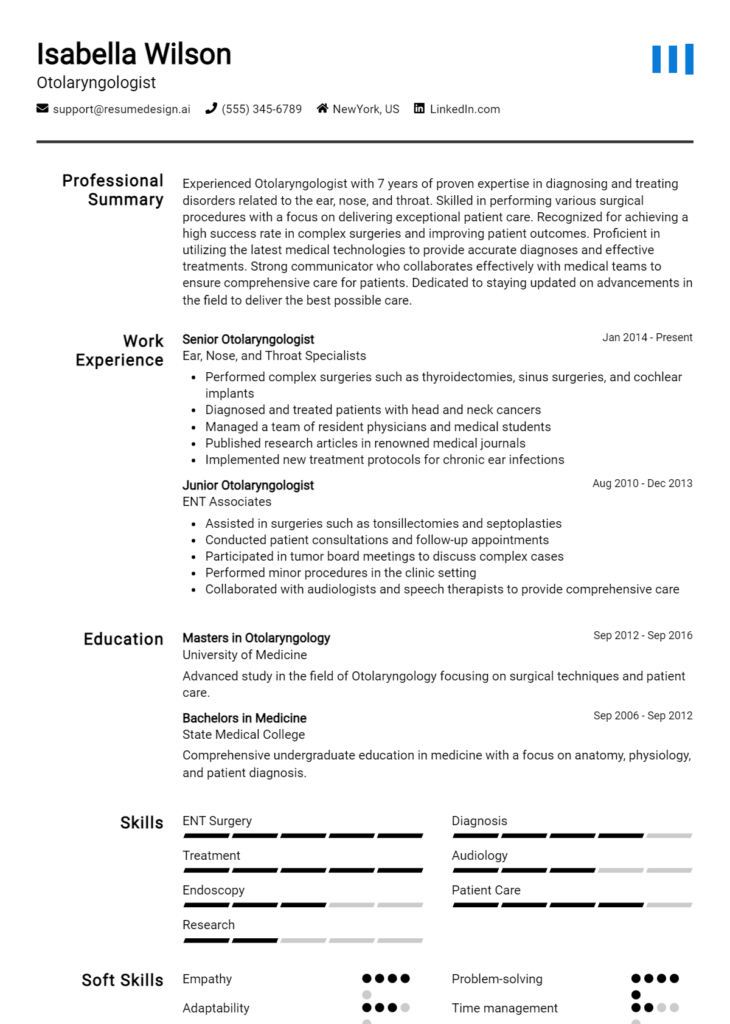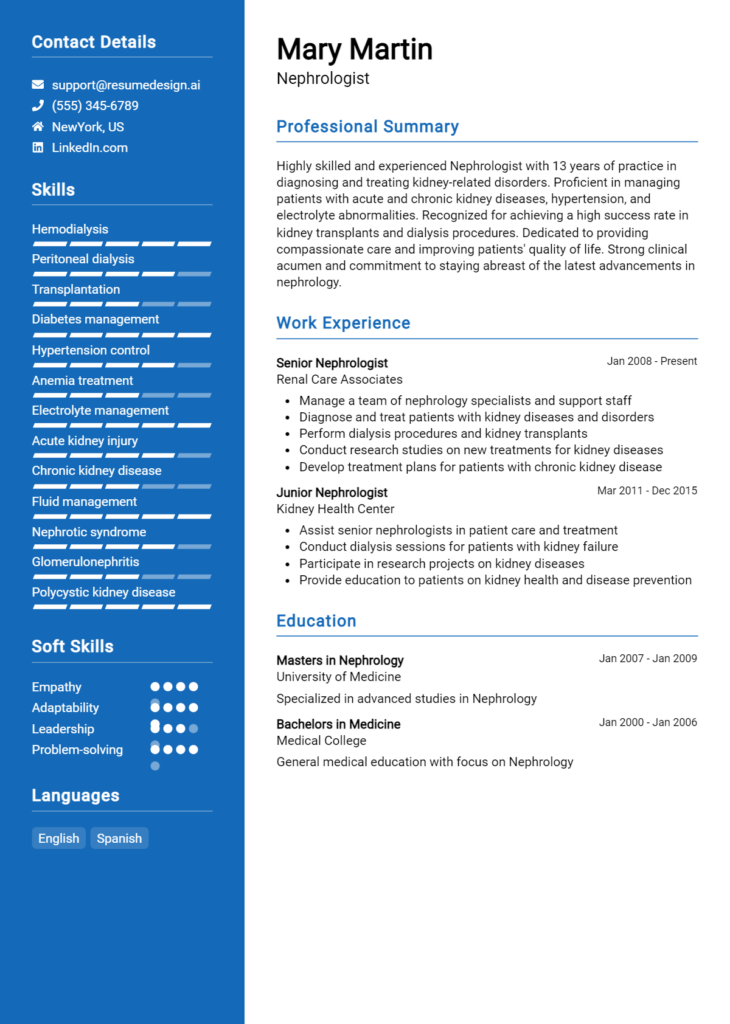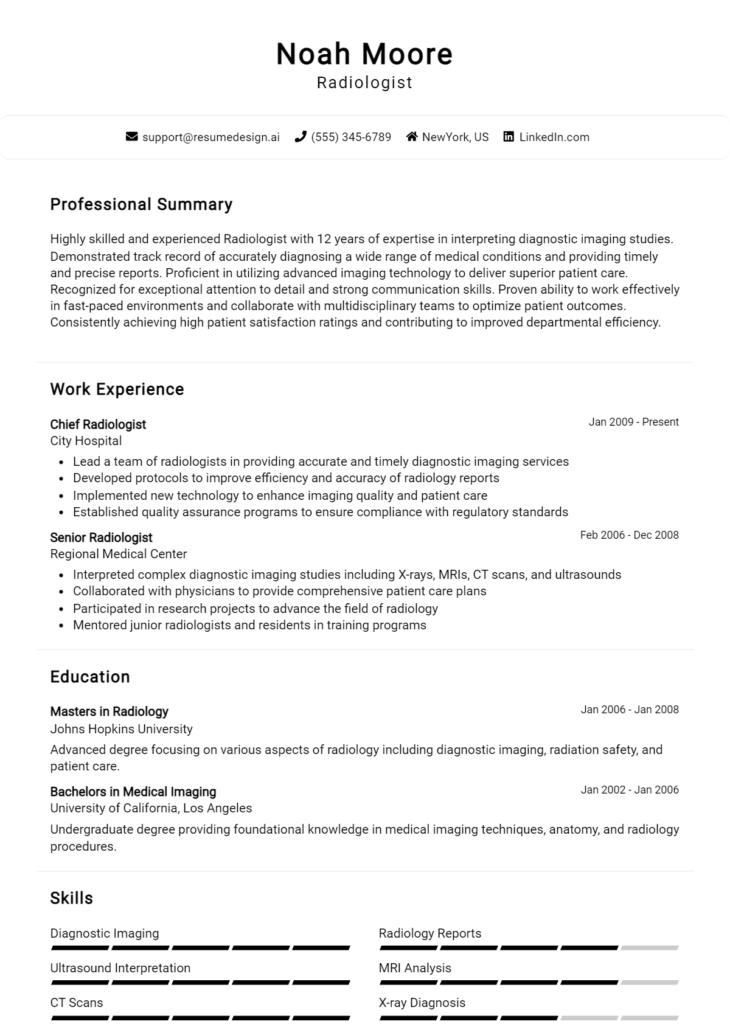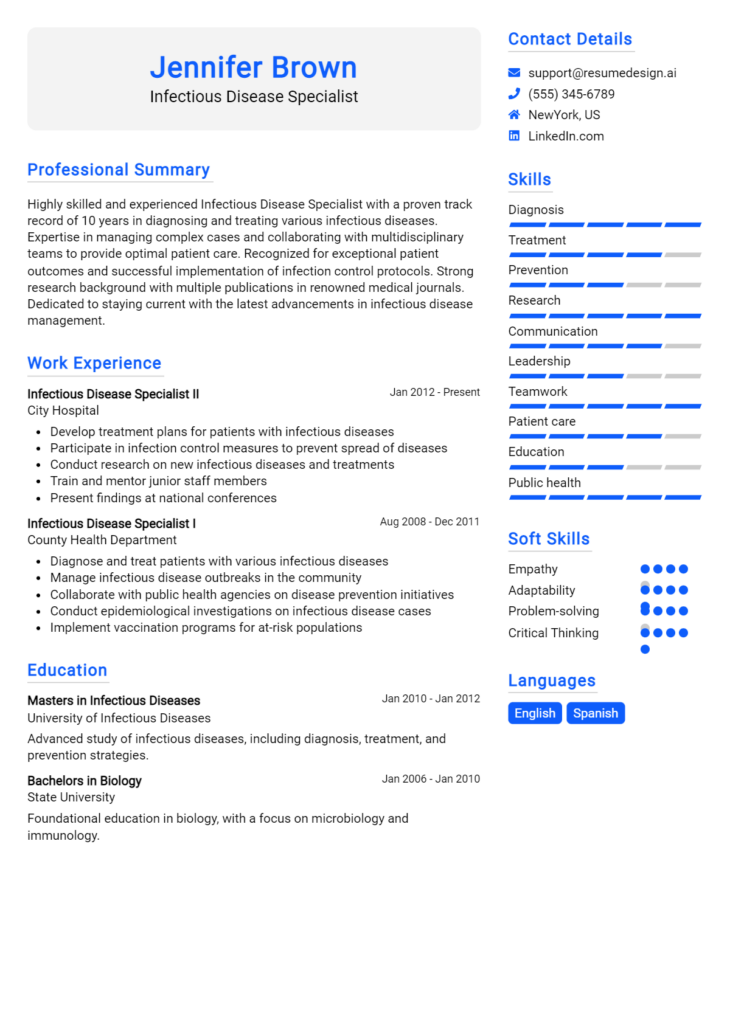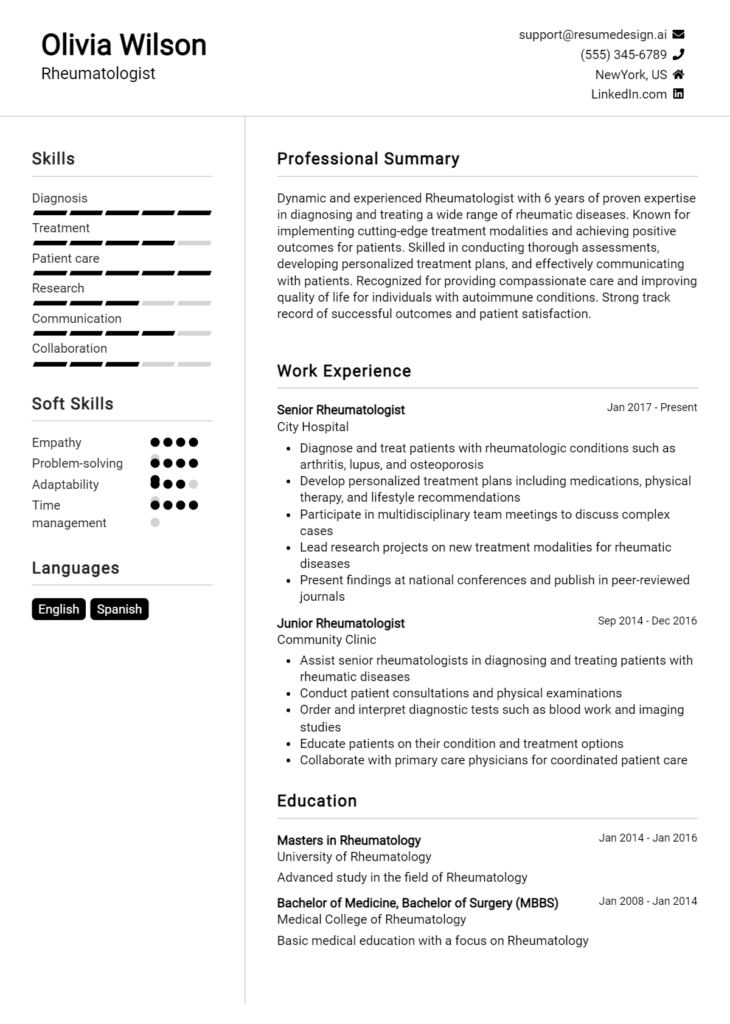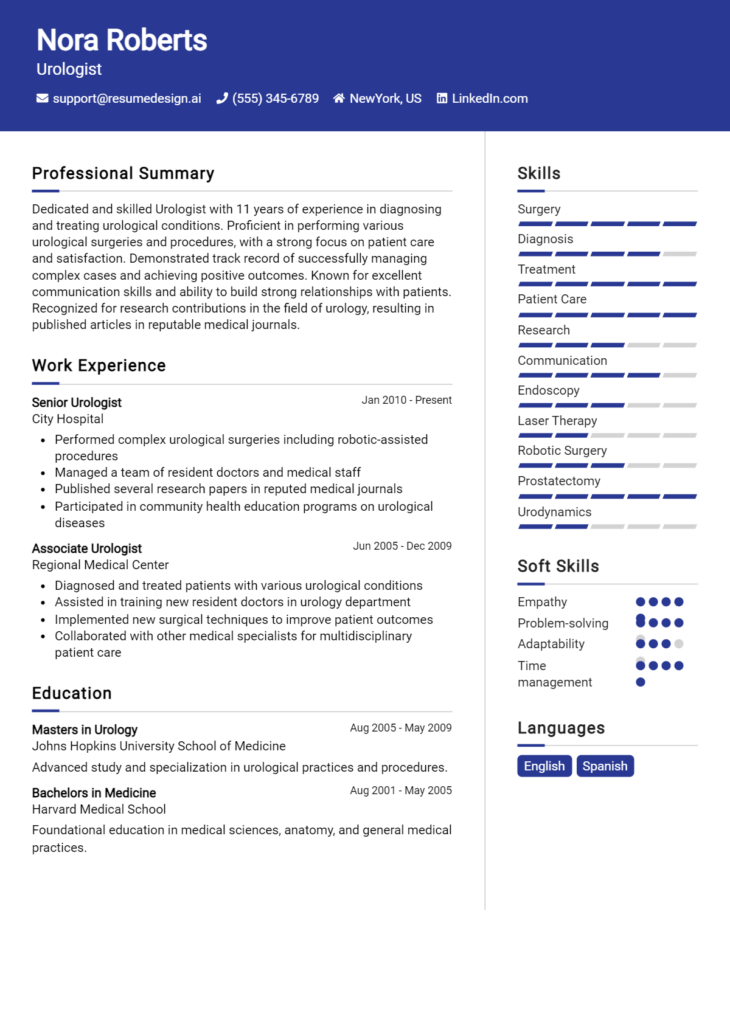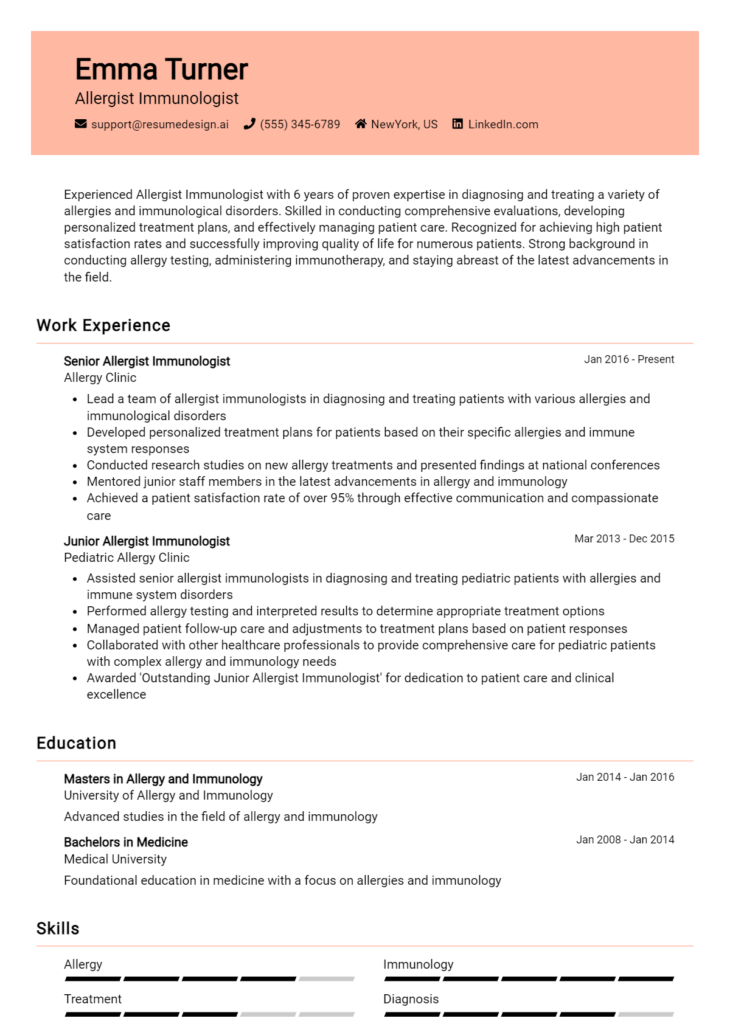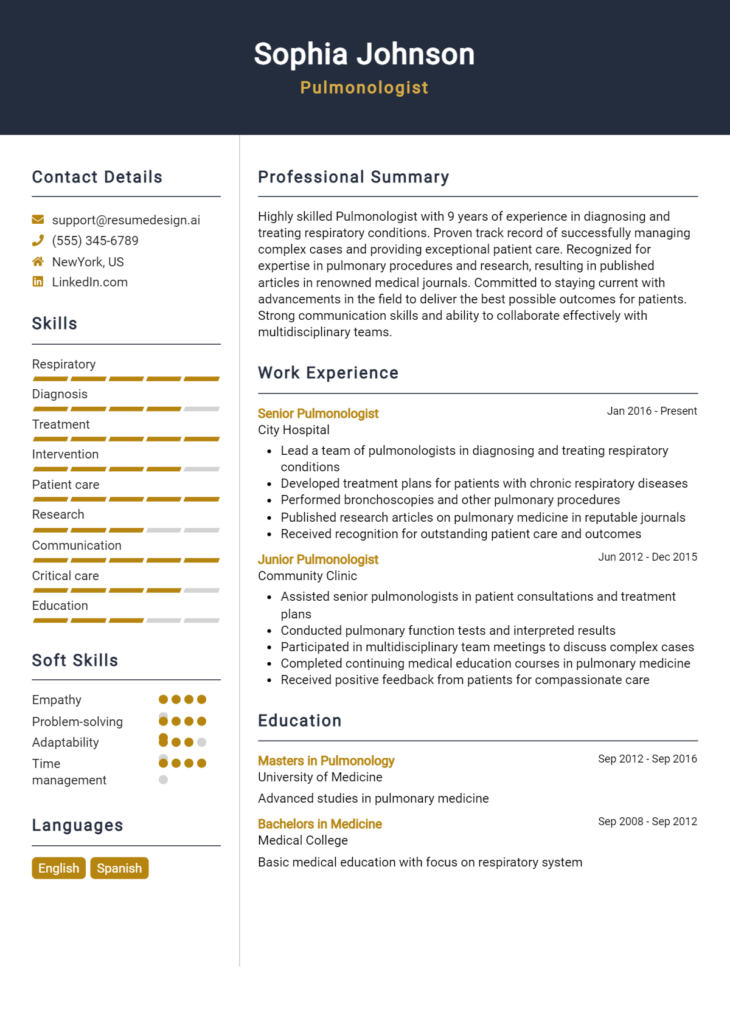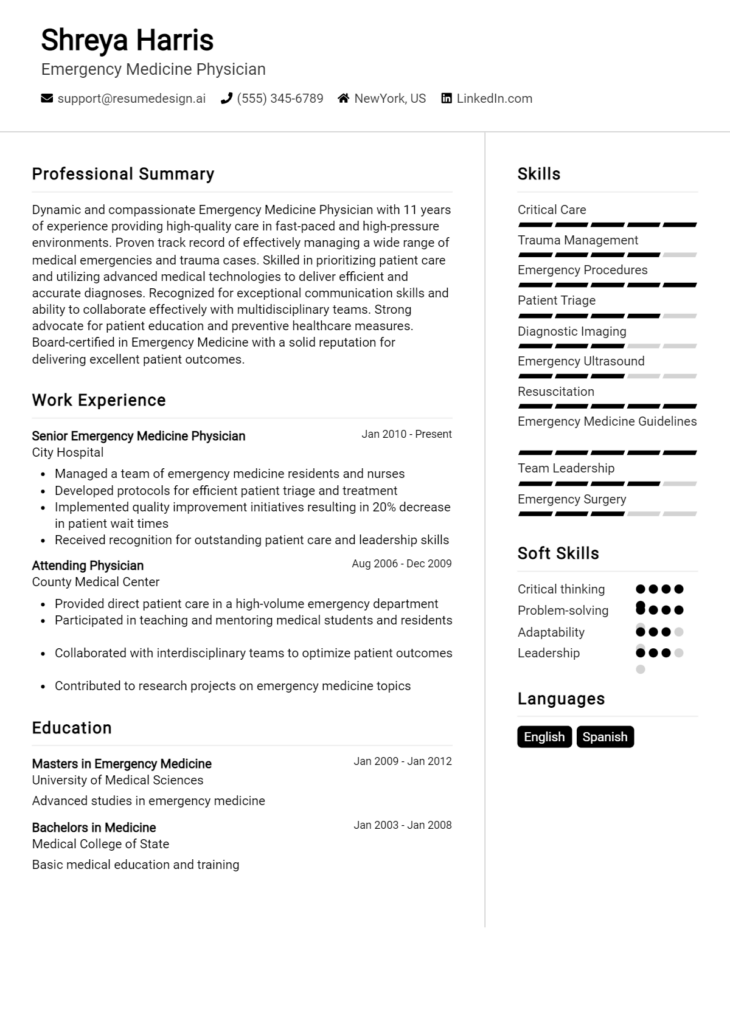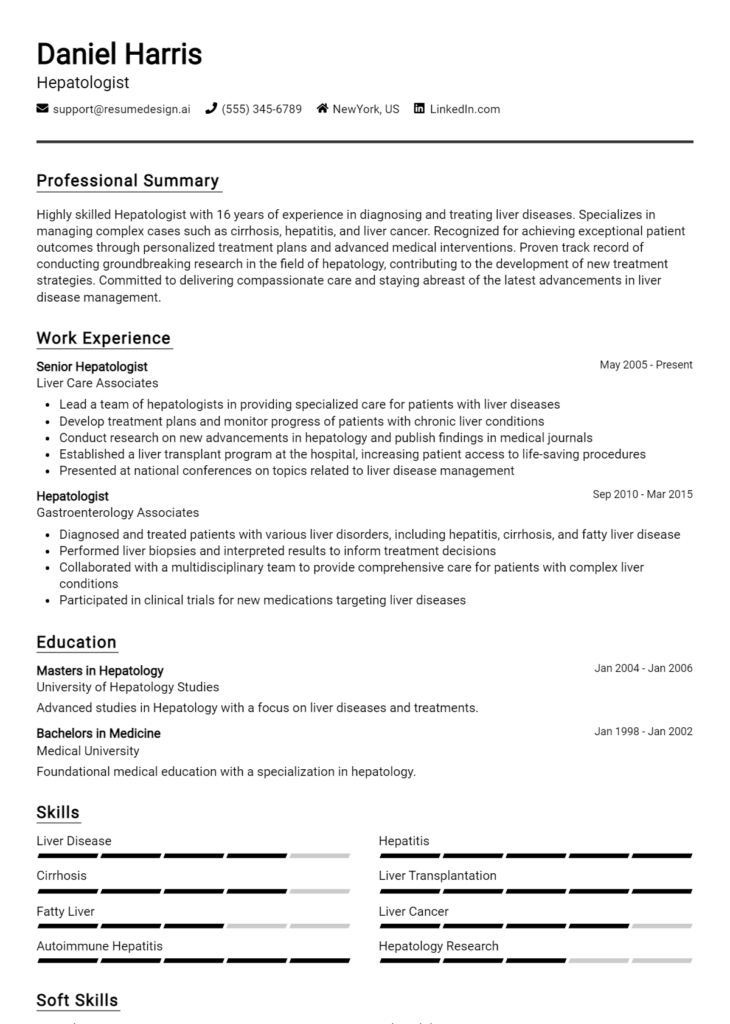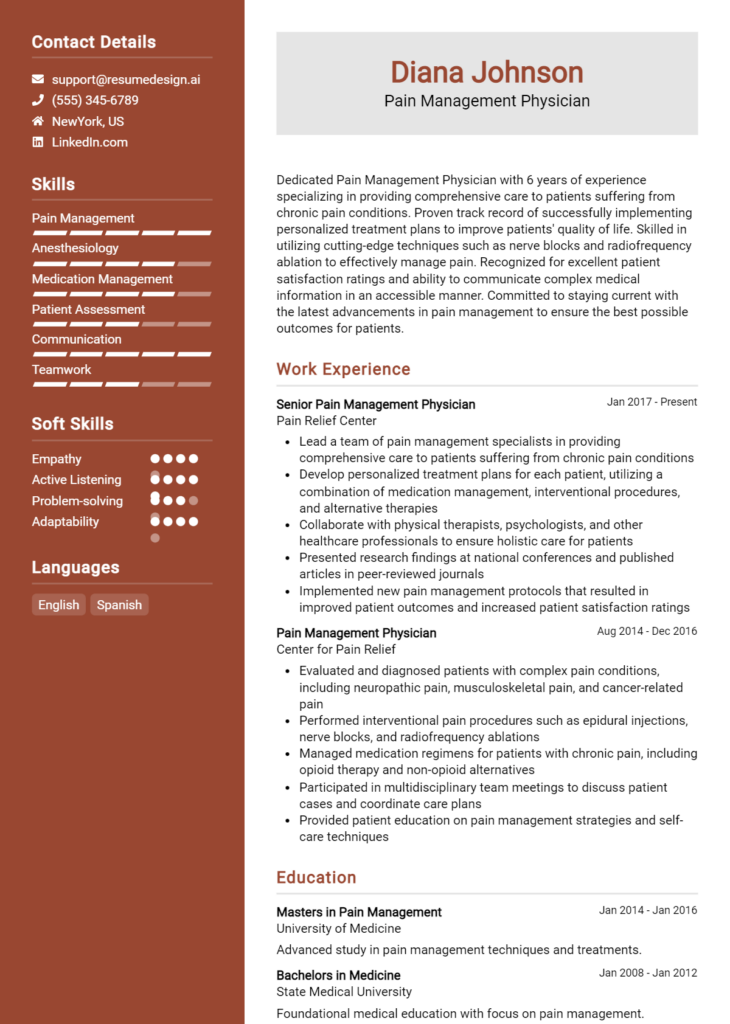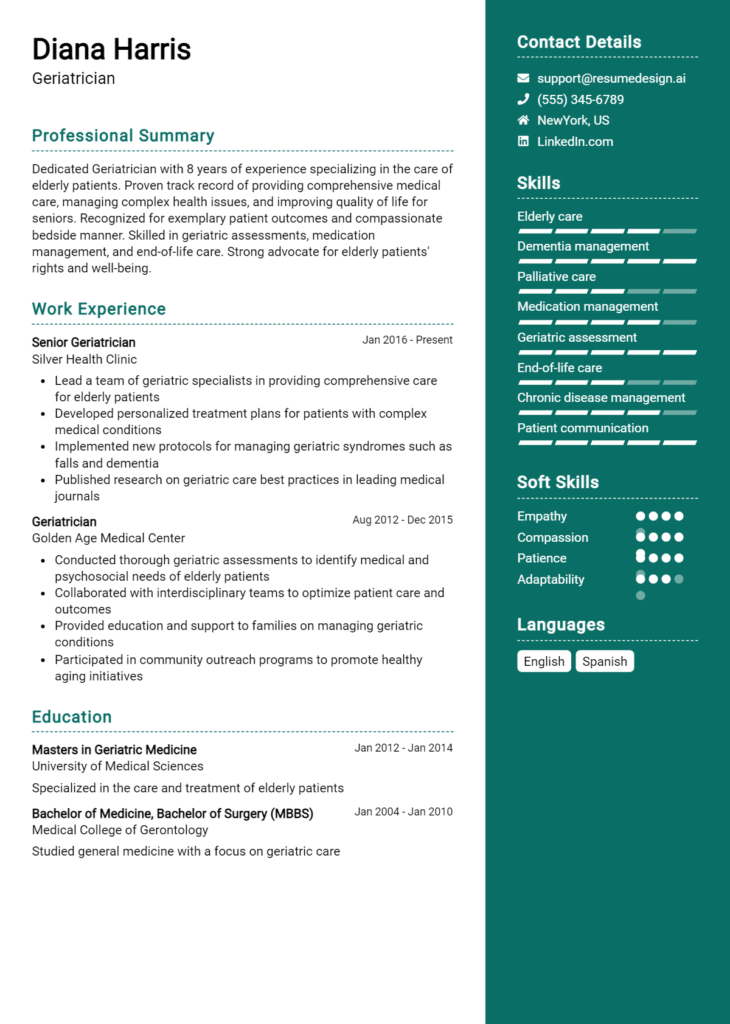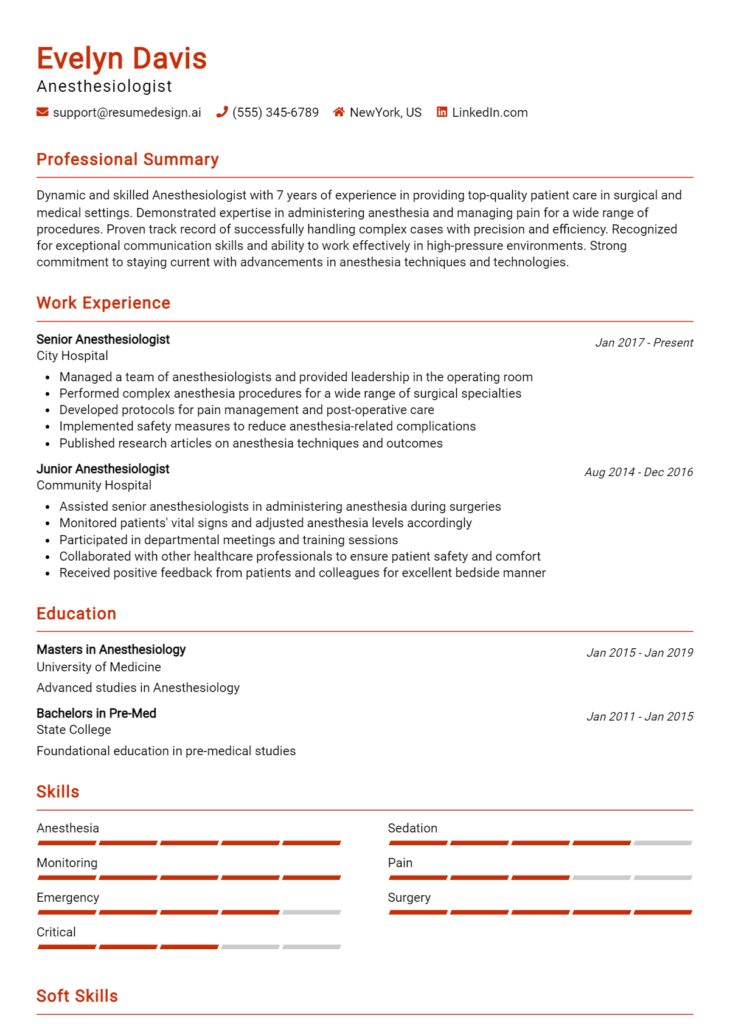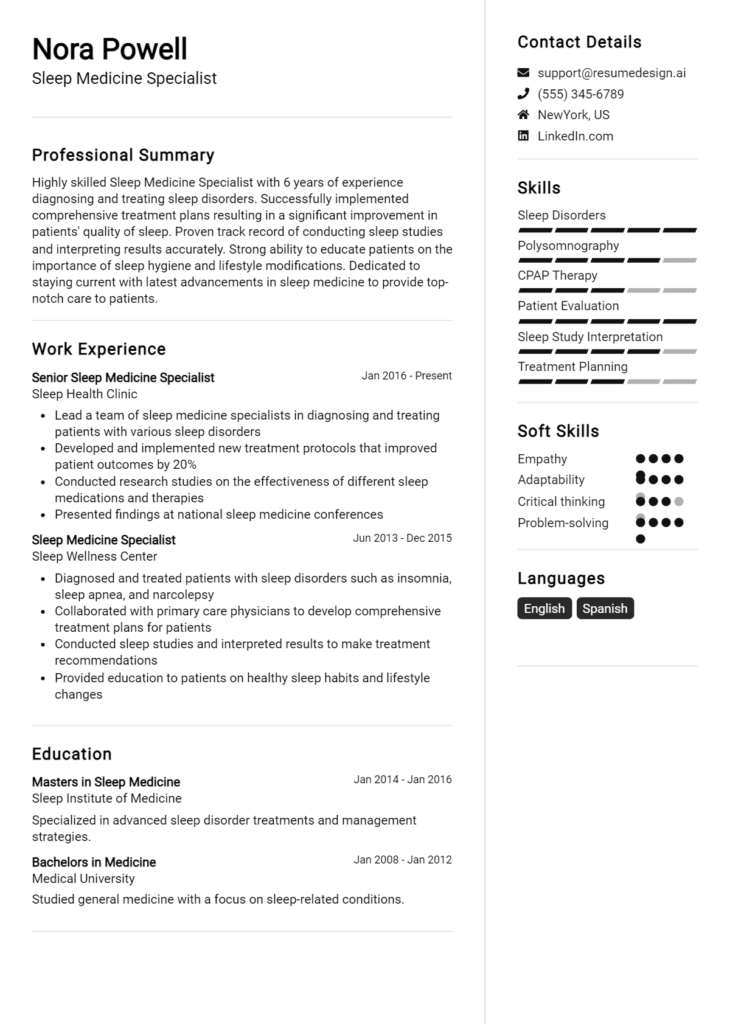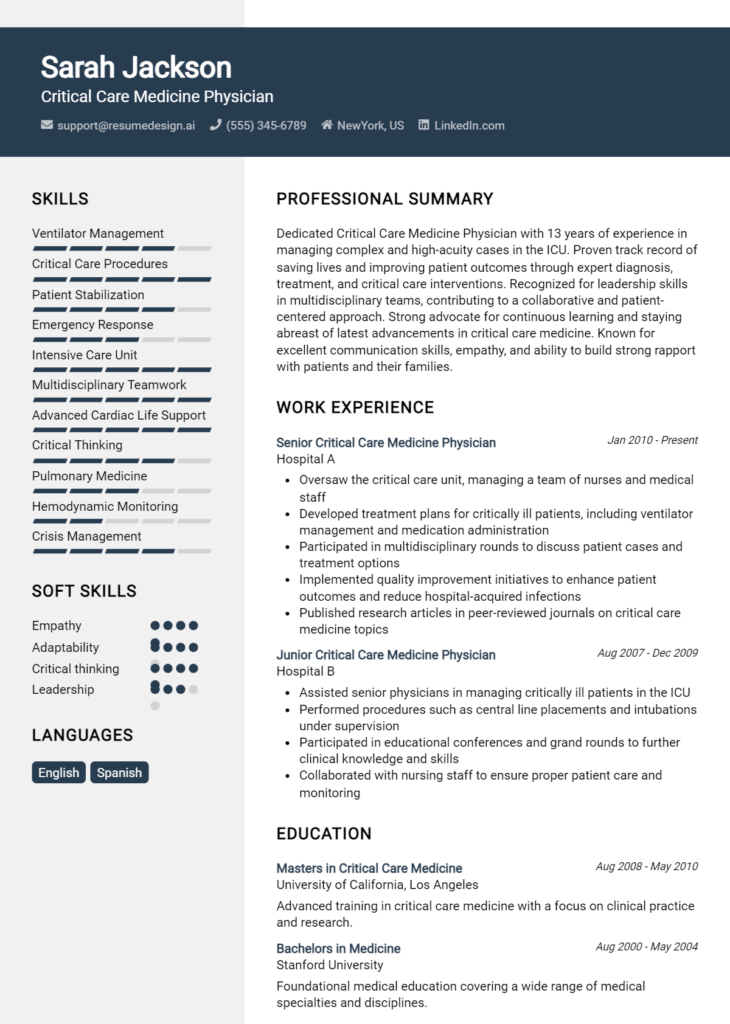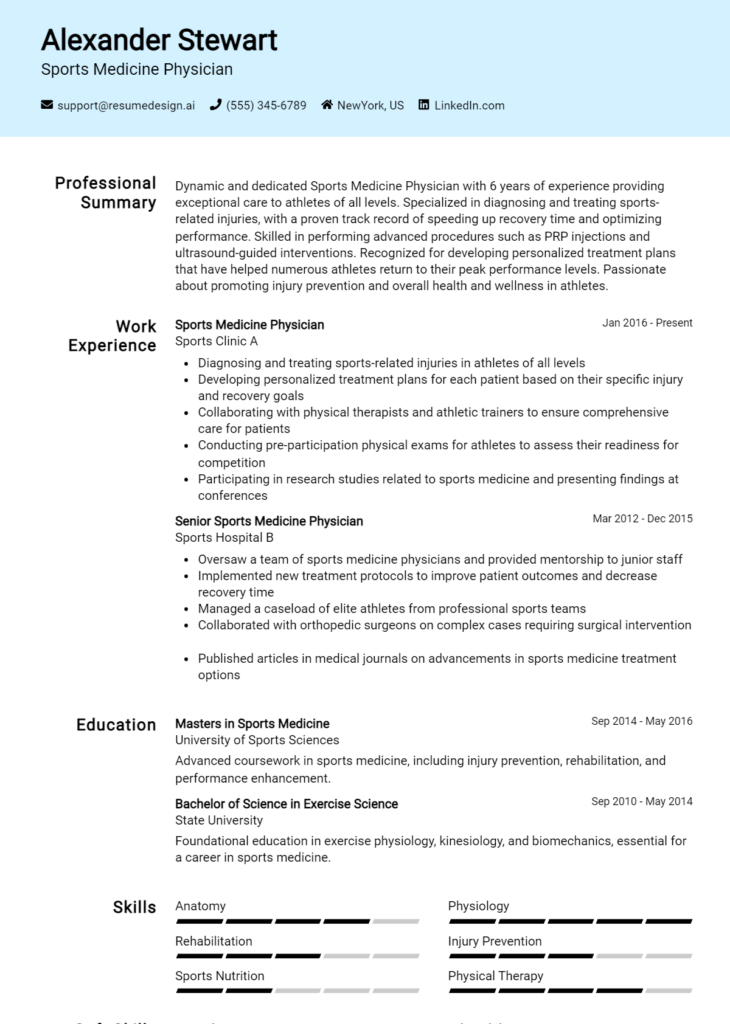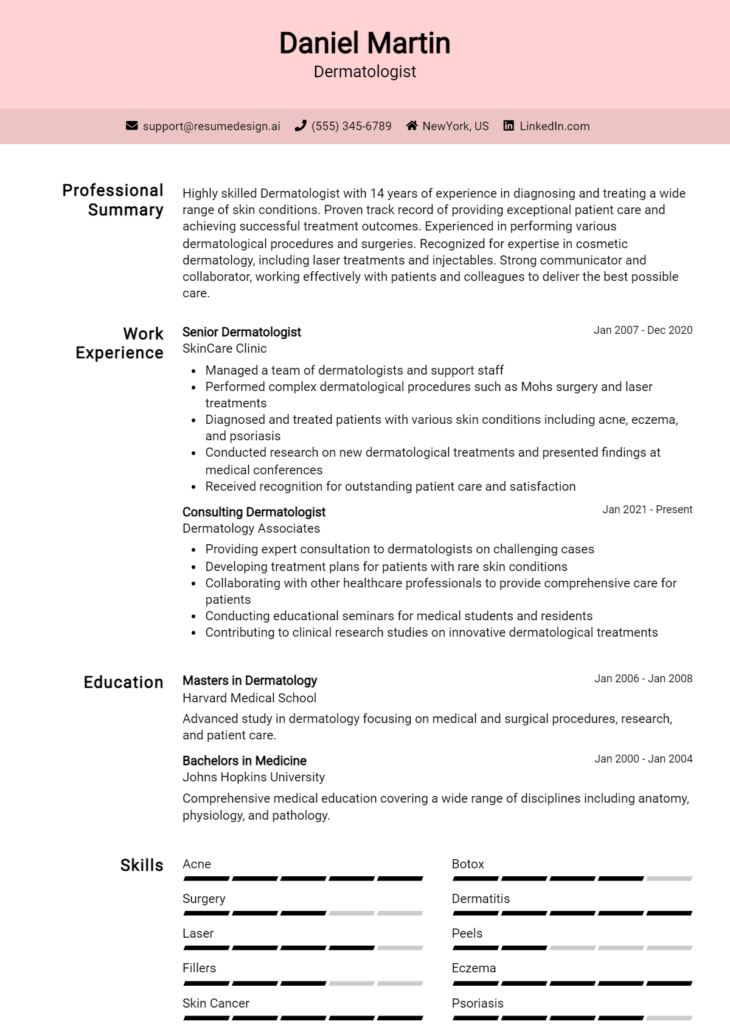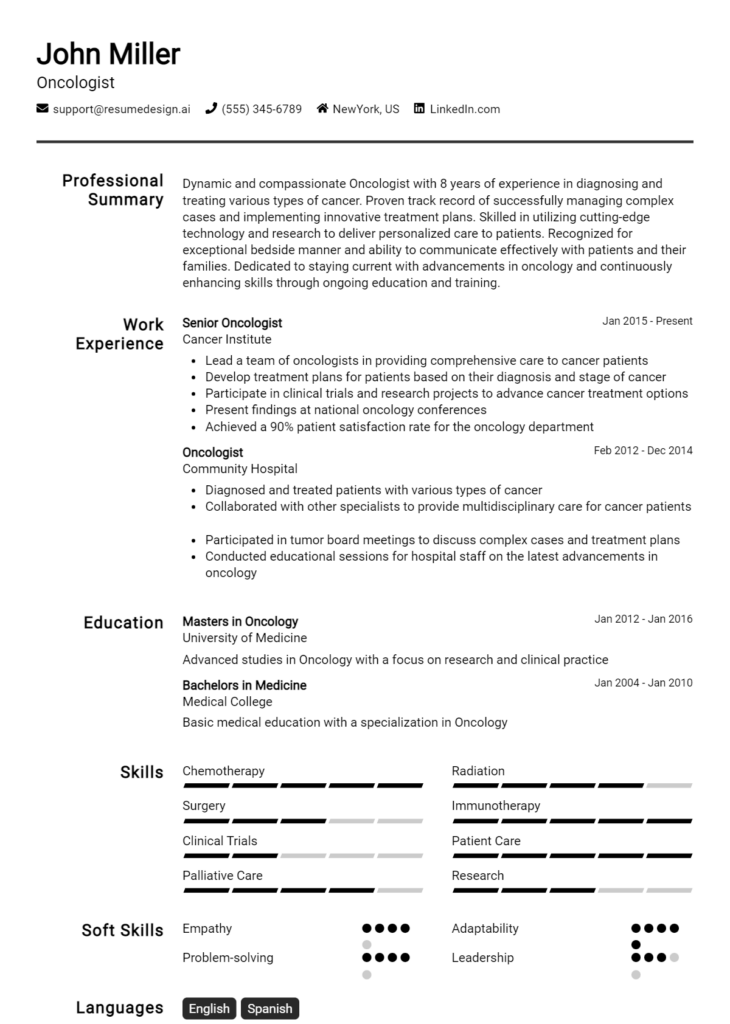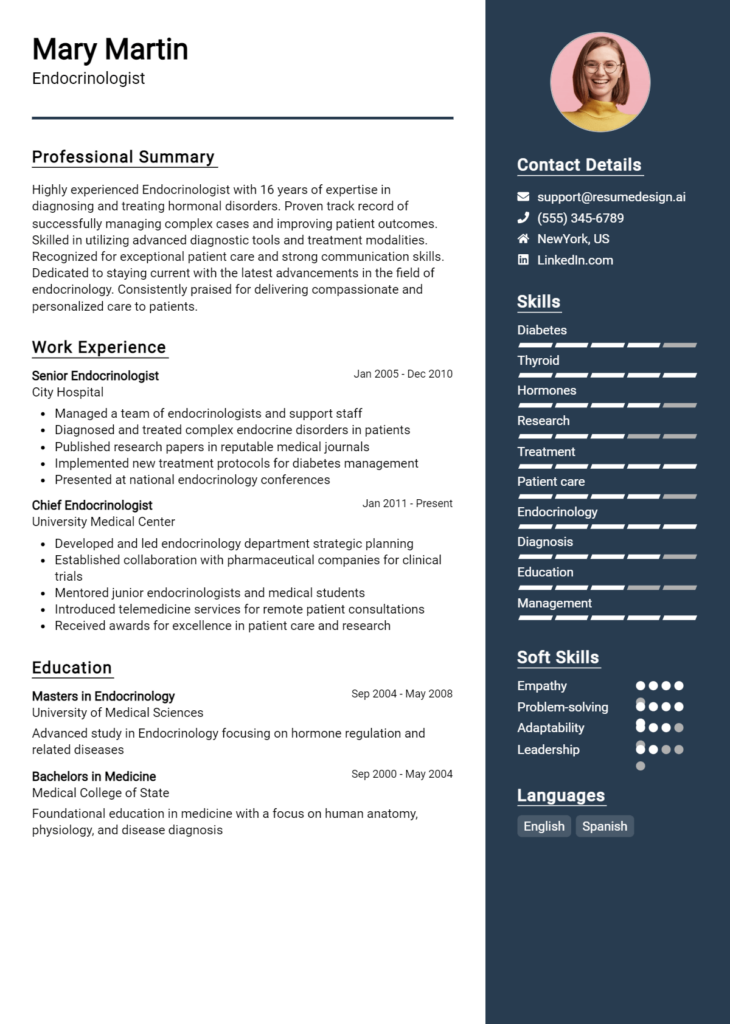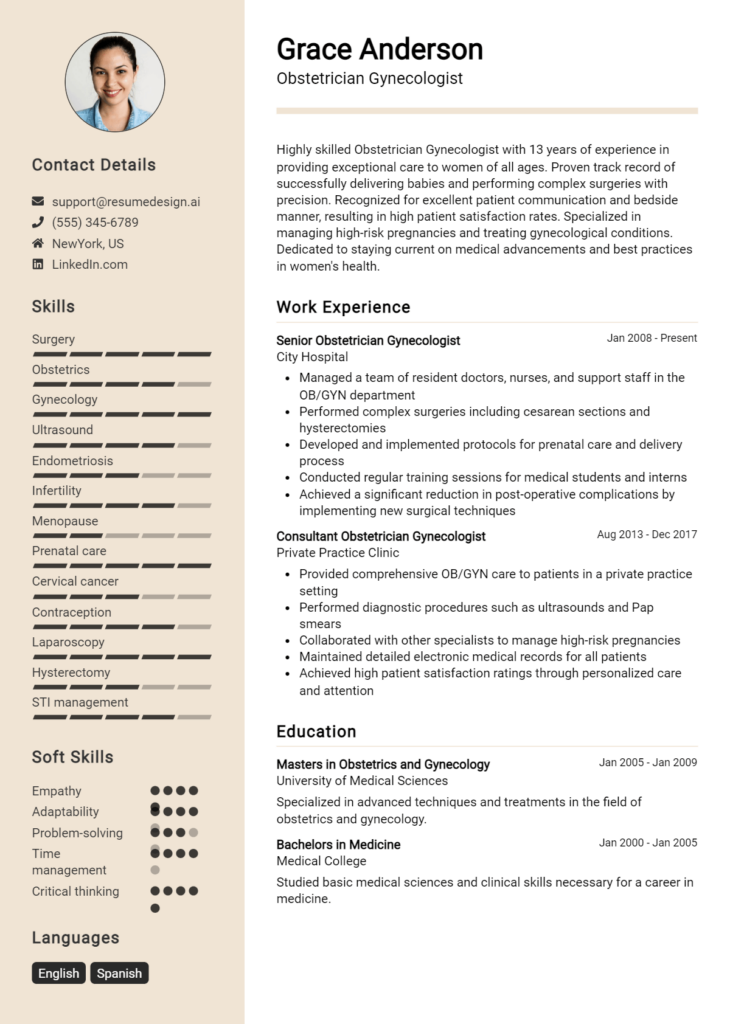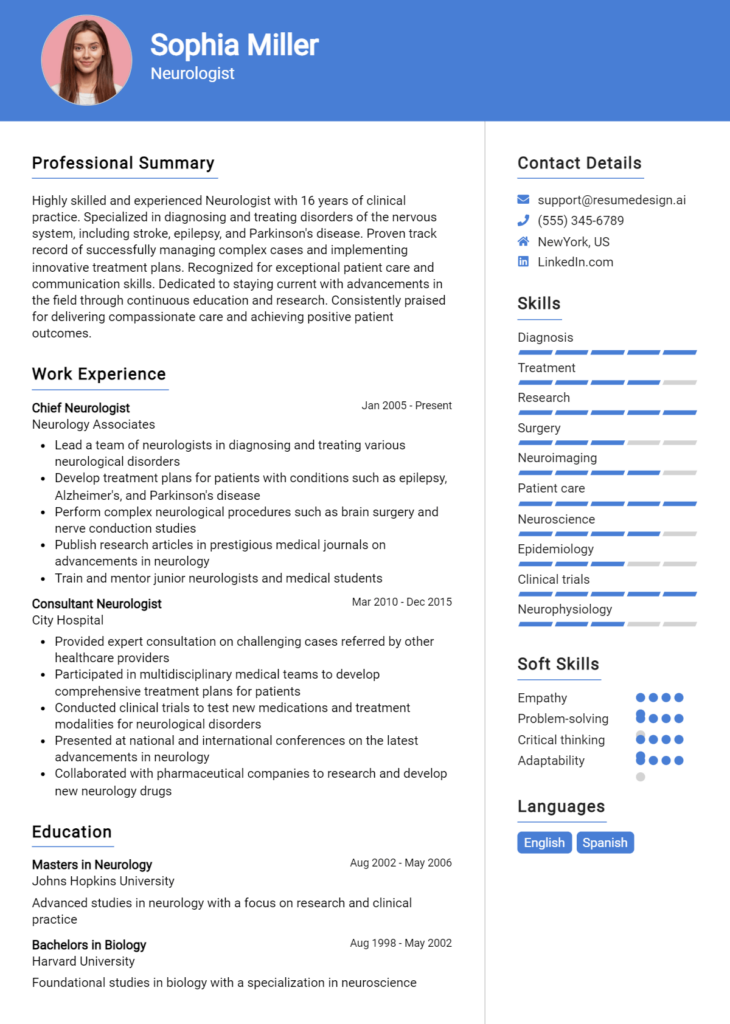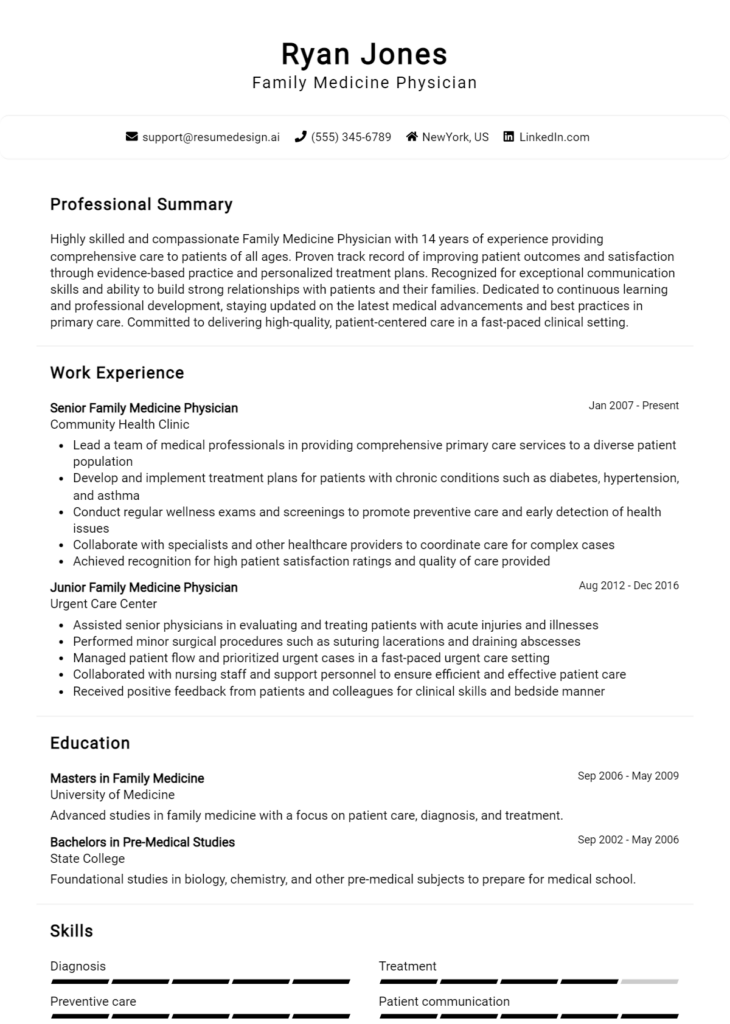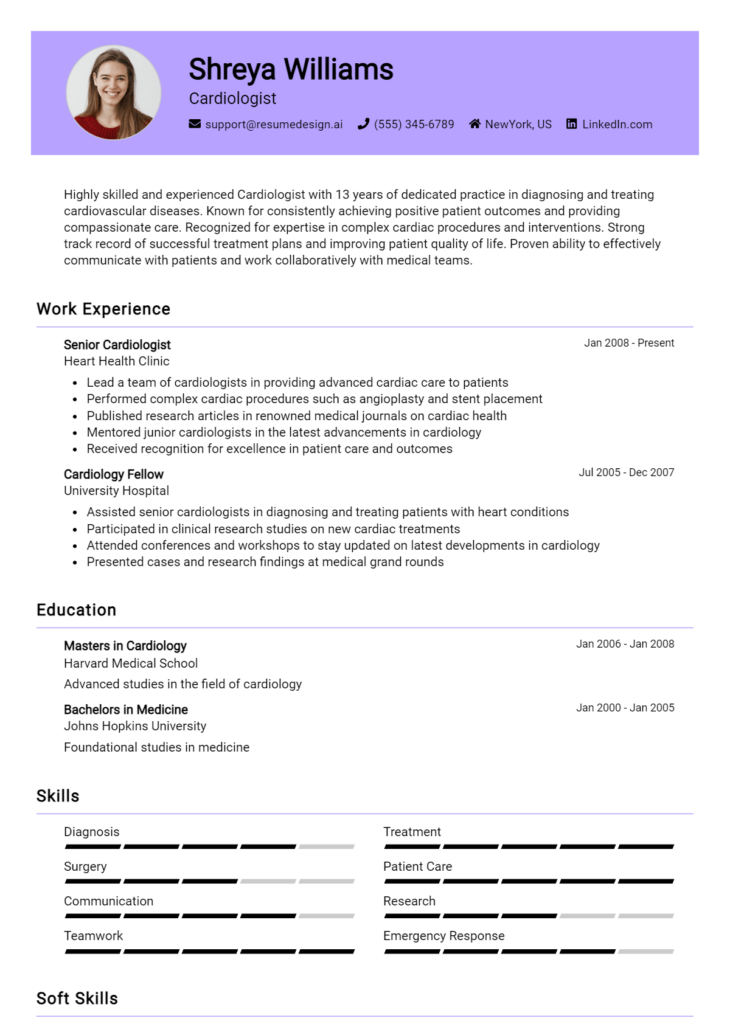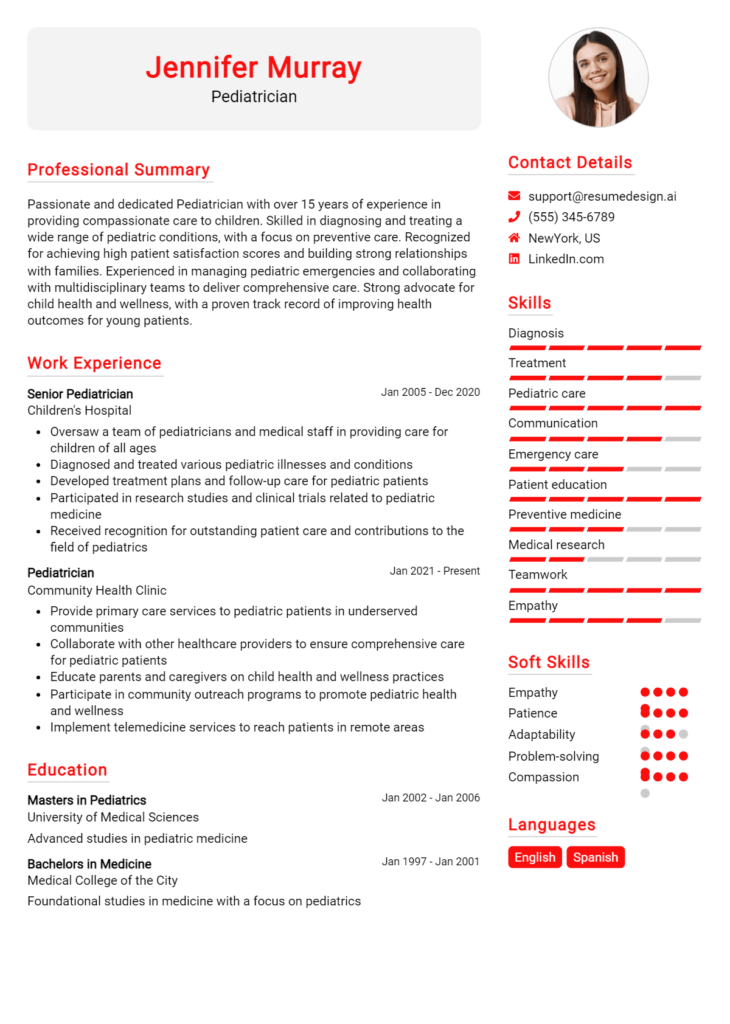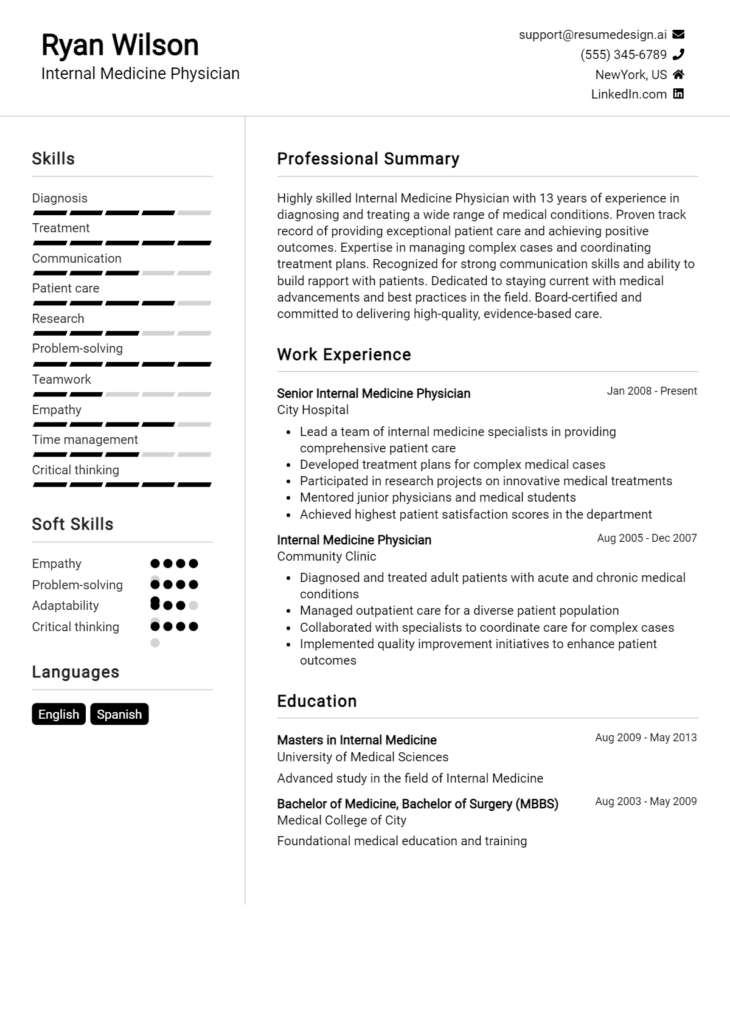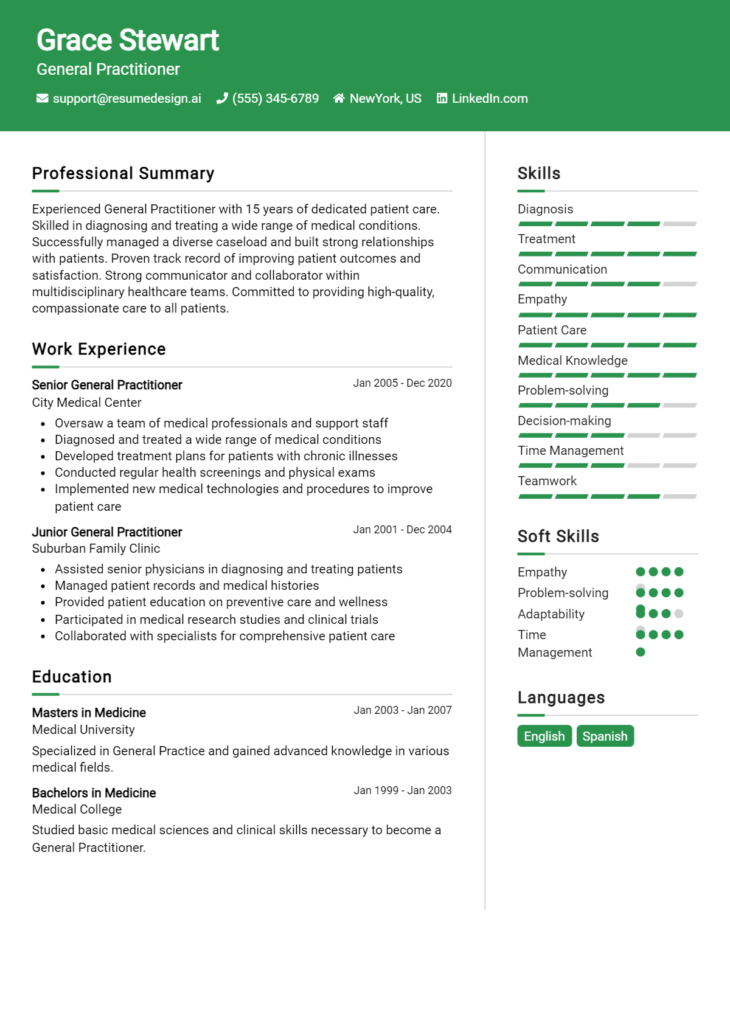Gastroenterologist Core Responsibilities
A Gastroenterologist is responsible for diagnosing and treating disorders of the digestive system. This role requires strong technical skills in endoscopic procedures, operational proficiency in patient management, and exceptional problem-solving abilities to interpret complex test results. Gastroenterologists often collaborate with other departments, such as radiology and pathology, to provide comprehensive care. These skills are crucial for achieving organizational goals, and a well-structured resume can effectively highlight these qualifications, showcasing a candidate's expertise and experience.
Common Responsibilities Listed on Gastroenterologist Resume
- Conducting comprehensive assessments and evaluations of patients with gastrointestinal disorders.
- Performing diagnostic and therapeutic endoscopic procedures, including colonoscopy and EGD.
- Interpreting results from laboratory tests and imaging studies.
- Developing and implementing individualized treatment plans.
- Providing patient education on gastrointestinal health and disease prevention.
- Collaborating with healthcare teams to coordinate multidisciplinary care.
- Monitoring patient progress and adjusting treatment protocols as necessary.
- Staying updated on advancements in gastroenterology and related medical technologies.
- Maintaining accurate and timely medical records and documentation.
- Participating in clinical research and contributing to medical publications.
- Educating medical students and residents in gastroenterology practices.
High-Level Resume Tips for Gastroenterologist Professionals
In the highly specialized field of gastroenterology, a well-crafted resume serves as a crucial tool for professionals seeking to make a strong first impression on potential employers. As the initial touchpoint in the hiring process, your resume should not only reflect your medical expertise and clinical skills, but also showcase your notable achievements and contributions to the field. Crafting a resume that effectively captures your qualifications is essential for standing out in a competitive job market. This guide will provide practical and actionable resume tips specifically tailored for gastroenterologist professionals, helping you to highlight your strengths and enhance your career prospects.
Top Resume Tips for Gastroenterologist Professionals
- Tailor your resume to the specific job description, emphasizing relevant skills and experiences that align with the employer's needs.
- Highlight your clinical experience in gastroenterology, including fellowships, residencies, and any specialized training relevant to the job.
- Quantify your achievements whenever possible, such as the number of procedures performed or improvements in patient outcomes, to demonstrate your impact.
- Include industry-specific keywords related to gastroenterology, such as endoscopy, colonoscopy, or inflammatory bowel disease, to pass through applicant tracking systems.
- Showcase your research contributions, including published papers or presentations at conferences, to highlight your commitment to advancing the field.
- Detail your experience with patient care, emphasizing your ability to communicate effectively and build rapport with patients.
- List relevant certifications, licenses, and memberships in professional organizations, as these add credibility to your qualifications.
- Incorporate your technological proficiency with medical software and tools used in gastroenterology, illustrating your adaptability to new advancements.
- Keep your resume concise and organized, ideally fitting onto one page, to ensure that it is easy for hiring managers to read quickly.
By implementing these tips, gastroenterologist professionals can significantly increase their chances of landing a job in their desired field. A polished and targeted resume not only highlights your qualifications but also communicates your passion and dedication to gastroenterology, making you a standout candidate in a competitive landscape.
Why Resume Headlines & Titles are Important for Gastroenterologist
In the competitive field of gastroenterology, a well-crafted resume headline or title plays a crucial role in capturing the attention of hiring managers. A strong headline serves as the first impression of a candidate's qualifications, summarizing key strengths and experiences in a concise, impactful phrase. This element is essential in quickly conveying relevance to the job being applied for, enabling the applicant to stand out among numerous candidates. By providing a clear and focused snapshot of their expertise, gastroenterologists can effectively highlight their unique qualifications, making it easier for employers to assess their fit for the role.
Best Practices for Crafting Resume Headlines for Gastroenterologist
- Keep it concise: Aim for 5-10 words that summarize your qualifications.
- Be role-specific: Tailor the headline to reflect the gastroenterologist position.
- Highlight key strengths: Focus on your top skills or areas of expertise.
- Use active language: Choose dynamic verbs to convey your capabilities.
- Incorporate relevant keywords: Use terms from the job description to enhance relevance.
- Avoid jargon: Use clear language that is easily understood by all readers.
- Showcase accomplishments: Include notable achievements that set you apart.
- Stay professional: Maintain a formal tone suitable for the medical field.
Example Resume Headlines for Gastroenterologist
Strong Resume Headlines
Board-Certified Gastroenterologist with 10+ Years of Experience in Advanced Endoscopy
Dedicated Gastroenterologist Specializing in Inflammatory Bowel Disease Management
Experienced Gastroenterologist Committed to Patient-Centered Care and Innovative Treatments
Weak Resume Headlines
Gastroenterologist Seeking Job
Healthcare Professional Looking for Opportunities
The strong resume headlines are effective because they distinctly communicate the candidate's qualifications, areas of specialization, and commitment to patient care, making them appealing to hiring managers seeking specific expertise. In contrast, the weak headlines fail to impress due to their vagueness and lack of detail, making it difficult for employers to gauge the candidate's true fit for the role. Clear, targeted headlines are essential for standing out in a competitive job market.
Writing an Exceptional Gastroenterologist Resume Summary
A well-crafted resume summary is crucial for a Gastroenterologist as it serves as the first impression for hiring managers. This brief introduction quickly highlights the candidate's key skills, relevant experience, and notable accomplishments in the field of gastroenterology. A strong summary not only captures attention but also sets the tone for the rest of the resume, making it imperative that it is concise, impactful, and tailored to the specific job the candidate is applying for. By effectively summarizing their qualifications, candidates can demonstrate their value and fit for the role right from the start.
Best Practices for Writing a Gastroenterologist Resume Summary
- Quantify achievements: Use numbers and statistics to demonstrate the impact of your work.
- Focus on relevant skills: Highlight specific gastroenterology skills that align with the job description.
- Tailor the summary: Customize your summary for each job application, addressing specific requirements.
- Use action verbs: Start sentences with dynamic verbs to convey proactivity and effectiveness.
- Highlight certifications: Mention any relevant board certifications or specialized training.
- Keep it concise: Aim for 2-4 sentences that encapsulate your professional identity and key contributions.
- Showcase clinical experience: Emphasize years of experience and areas of expertise in gastroenterology.
- Incorporate soft skills: Include interpersonal skills that demonstrate your ability to connect with patients.
Example Gastroenterologist Resume Summaries
Strong Resume Summaries
Compassionate and board-certified gastroenterologist with over 10 years of experience in performing advanced endoscopic procedures. Successfully reduced patient wait times by 30% through optimized workflow processes in a busy clinic environment.
Dedicated gastroenterologist with a proven track record of managing complex cases and achieving a 95% patient satisfaction rate. Expert in inflammatory bowel disease and gastroesophageal reflux disease, with over 200 successful surgical interventions performed annually.
Results-driven gastroenterologist with 8 years of clinical expertise in diagnosing and treating gastrointestinal disorders. Spearheaded a community outreach program that increased early detection of colorectal cancer by 40% within two years.
Weak Resume Summaries
Experienced doctor who works in a hospital and treats digestive issues.
Gastroenterologist with some experience looking for a job where I can use my skills.
The strong resume summaries excel due to their specificity, quantifiable achievements, and relevant skills that align with the role of a gastroenterologist. They emphasize measurable outcomes and demonstrate the candidate's impact on patient care and operational efficiency. Conversely, the weak summaries are vague and lack detail, failing to convey the candidate's qualifications or the value they bring to potential employers. This highlights the importance of crafting a targeted and informative summary that stands out in a competitive job market.
Work Experience Section for Gastroenterologist Resume
The work experience section of a Gastroenterologist resume is crucial as it serves as a platform to demonstrate the candidate's technical skills, leadership abilities, and commitment to delivering high-quality patient care. This section not only highlights the physician's clinical expertise and proficiency in advanced gastrointestinal procedures but also showcases their capacity to manage teams effectively and collaborate with interdisciplinary health professionals. Quantifying achievements—such as patient outcomes, procedural success rates, or improvements in departmental efficiency—while aligning experiences with industry standards is essential for creating a compelling narrative that sets the candidate apart in a competitive job market.
Best Practices for Gastroenterologist Work Experience
- Highlight specific technical skills relevant to gastroenterology, such as endoscopy or colonoscopy proficiency.
- Quantify achievements with metrics, such as the percentage of successful procedures or patient satisfaction scores.
- Emphasize leadership roles, including managing a team of healthcare professionals or leading a departmental initiative.
- Include collaboration examples with other healthcare providers to demonstrate teamwork and holistic patient care.
- Focus on continuous education and training, showcasing certifications or specialized courses completed.
- Use action verbs to convey impact and engagement in the role, such as 'implemented,' 'led,' or 'enhanced.'
- Tailor experiences to align with the job description and industry standards, ensuring relevance and specificity.
- Maintain a clear and concise format to improve readability and highlight key points effectively.
Example Work Experiences for Gastroenterologist
Strong Experiences
- Performed over 500 successful endoscopic procedures annually, achieving a 95% patient satisfaction rating.
- Led a multidisciplinary team to implement a new patient care protocol, resulting in a 25% reduction in procedure wait times.
- Developed and conducted a training program for residents, improving their procedural skills and confidence as evidenced by a 30% increase in successful outcomes.
- Collaborated with nutritionists and surgeons to create a comprehensive treatment plan for patients with complex gastrointestinal disorders, resulting in a 40% improvement in patient recovery times.
Weak Experiences
- Worked at a hospital performing various procedures.
- Responsible for managing patients and their treatments.
- Assisted in some endoscopic procedures.
- Participated in departmental meetings and discussions.
The examples provided illustrate the difference between strong and weak experiences in a Gastroenterologist's resume. Strong experiences are quantifiable, specific, and demonstrate leadership and collaboration, showcasing the candidate's impact on the organization and patient care. In contrast, weak experiences lack detail, measurable outcomes, and fail to highlight the candidate's contributions effectively, making them less compelling to potential employers.
Education and Certifications Section for Gastroenterologist Resume
The education and certifications section of a Gastroenterologist resume is crucial for demonstrating the candidate's academic achievements, specialized training, and commitment to ongoing professional development. This section not only highlights the foundational knowledge gained through formal education but also showcases industry-relevant certifications that validate the candidate's expertise. By including relevant coursework, advanced certifications, and specialized training, candidates can significantly enhance their credibility and show potential employers their alignment with the requirements of the gastroenterology field. A well-crafted education and certifications section provides a comprehensive overview of the candidate's qualifications, making a strong case for their suitability for the role.
Best Practices for Gastroenterologist Education and Certifications
- Highlight relevant degrees and training programs, such as an MD or DO with a focus in internal medicine and gastroenterology.
- Include board certifications, such as the American Board of Internal Medicine (ABIM) and the American Board of Gastroenterology (ABG).
- List any fellowship training specific to gastroenterology, including the duration and institution.
- Provide details on relevant coursework that enhances understanding of gastrointestinal diseases, procedures, and treatment methodologies.
- Incorporate additional certifications, such as Advanced Cardiac Life Support (ACLS) or Basic Life Support (BLS), to demonstrate comprehensive medical training.
- Showcase any continuing medical education (CME) credits or workshops attended that pertain to gastroenterology.
- Emphasize any research, publications, or presentations related to gastrointestinal health that indicate a commitment to advancing the field.
- Keep the information current and relevant, avoiding outdated certifications or degrees that may not reflect the candidate's current knowledge or capabilities.
Example Education and Certifications for Gastroenterologist
Strong Examples
- Doctor of Medicine (MD) - Johns Hopkins University, School of Medicine, 2015
- Fellowship in Gastroenterology - Mayo Clinic, 2018
- Board Certified in Gastroenterology - American Board of Gastroenterology, 2019
- Advanced Endoscopy Techniques Course - American Gastroenterological Association, 2021
Weak Examples
- Bachelor of Arts in History - University of California, 2010
- Certified in Basic Life Support (BLS) - 2010 (not current)
- Completed a one-day seminar on Nutrition - 2015
- Non-Medical Certification in Project Management - 2019
The strong examples are considered effective because they are directly relevant to the field of gastroenterology, showcasing advanced education and specialized training that align with the job requirements. In contrast, the weak examples lack relevance to the gastroenterology specialty, include outdated or non-medical certifications, and reflect educational experiences that do not contribute to the applicant's qualifications as a gastroenterologist. This distinction is essential for demonstrating the candidate's readiness and suitability for the role.
Top Skills & Keywords for Gastroenterologist Resume
In the competitive field of gastroenterology, a well-crafted resume is essential to showcase both your professional qualifications and unique skills. The importance of skills in a gastroenterologist resume cannot be overstated, as they not only reflect your expertise in diagnosis and treatment but also highlight your ability to connect with patients and collaborate with medical teams. A strong emphasis on relevant skills can significantly enhance your chances of standing out to potential employers and securing a coveted position in this specialized area of medicine.
Top Hard & Soft Skills for Gastroenterologist
Soft Skills
- Excellent communication skills
- Empathy and compassion
- Strong interpersonal skills
- Attention to detail
- Problem-solving abilities
- Patient-centered approach
- Team collaboration
- Time management
- Adaptability
- Critical thinking
- Leadership capabilities
- Conflict resolution
- Stress management
- Organizational skills
Hard Skills
- Proficient in endoscopic procedures
- Expertise in gastrointestinal diagnostics
- Knowledge of treatment protocols
- Familiarity with electronic health records (EHR)
- Competence in interpreting lab results
- Ability to perform colonoscopies and upper GI endoscopies
- Understanding of advanced imaging techniques
- Familiarity with pharmacology related to gastroenterology
- Skill in managing chronic gastrointestinal diseases
- Knowledge of nutritional counseling for patients
- Experience in conducting clinical research
- Proficiency in patient assessment and evaluation
- Ability to develop personalized treatment plans
- Knowledge of infection control practices
- Familiarity with regulatory compliance in healthcare
- Experience in mentoring or teaching medical staff
- Understanding of the latest gastroenterological technologies
For more information on how to effectively highlight your skills and work experience, consider refining your resume to better reflect your qualifications in the field of gastroenterology.
Stand Out with a Winning Gastroenterologist Cover Letter
As a board-certified gastroenterologist with over five years of experience in diagnosing and treating a wide range of gastrointestinal disorders, I am excited to apply for the position at your esteemed healthcare facility. My commitment to providing exceptional patient care, combined with my extensive knowledge of advanced gastrointestinal procedures, positions me as a strong candidate for this role. I am particularly drawn to your institution's emphasis on cutting-edge research and patient-centered care, which aligns perfectly with my professional values.
Throughout my career, I have developed a comprehensive skill set that includes performing endoscopic procedures, managing chronic gastrointestinal diseases, and collaborating with multidisciplinary teams to create tailored treatment plans. At my current practice, I have successfully implemented a patient education program that has improved patient compliance and satisfaction, resulting in better health outcomes. I am adept at utilizing the latest technologies and methodologies in gastroenterology, and I am committed to staying updated on emerging trends to enhance patient care.
I am particularly impressed by your facility’s initiatives to foster community health through outreach programs and preventive care. I am eager to contribute my expertise in these areas, promoting awareness and education about gastrointestinal health. Additionally, I am excited about the opportunity to engage in clinical research and contribute to the advancement of our field, ensuring that I remain at the forefront of gastroenterology practices.
I am looking forward to the possibility of joining your team and contributing to the high standards of care that your institution is known for. Thank you for considering my application. I am eager to discuss how my skills and experiences align with the needs of your practice and how I can contribute to the well-being of your patients.
Common Mistakes to Avoid in a Gastroenterologist Resume
When applying for a position as a gastroenterologist, your resume serves as your first impression to potential employers. Crafting a compelling resume can be challenging, and many candidates make common mistakes that can hinder their chances of landing an interview. By avoiding these pitfalls, you can ensure that your qualifications and expertise are presented clearly and effectively.
Overly Complex Language: Using jargon or overly technical terms can make your resume difficult to read. Stick to clear, concise language that showcases your expertise without alienating the reader.
Lack of Specificity: General statements about your experience can dilute the impact of your accomplishments. Be specific about your skills, procedures performed, and any subspecialties you may have.
Ignoring Keywords: Failing to incorporate relevant keywords from the job description can prevent your resume from getting past applicant tracking systems. Tailor your resume for each application by including these keywords.
Omitting Relevant Certifications: Gastroenterology requires specific certifications and training. Ensure that you prominently list your board certifications, fellowships, and any relevant continuing education.
Neglecting Soft Skills: While technical skills are crucial, soft skills such as communication, empathy, and teamwork are equally important in patient care. Highlight these skills alongside your medical expertise.
Inconsistent Formatting: A cluttered or inconsistent format can distract from your qualifications. Use a clean, professional layout with uniform headings, bullet points, and font sizes for easy readability.
Failure to Quantify Achievements: When possible, use numbers to quantify your achievements, such as the number of procedures performed, patient satisfaction scores, or improvements in patient outcomes.
Excessive Length: A lengthy resume can overwhelm hiring managers. Aim for a concise document that highlights your most relevant experiences and achievements, ideally within one to two pages.
Conclusion
As a gastroenterologist, your expertise in diagnosing and treating digestive system disorders is crucial to patient health. This article highlighted the essential skills and qualifications needed for the role, including advanced medical training, strong analytical abilities, and excellent communication skills. We also discussed the importance of staying updated with the latest advancements in gastroenterology to provide the best patient care.
In conclusion, if you are looking to enhance your career as a gastroenterologist, it’s vital to have a standout resume that effectively showcases your qualifications and experiences. Take the time to review your gastroenterologist resume and make sure it reflects your strengths and accomplishments.
To assist you in this process, a variety of resources are available to help you create a professional and polished resume. Consider using our resume templates to get started, or utilize our resume builder for a more customized approach. You can also check out our resume examples for inspiration and ideas on how to present your skills effectively. Additionally, don’t forget to craft an impressive cover letter using our cover letter templates, which can help you make a strong first impression.
Now is the time to take action and elevate your career in gastroenterology!

